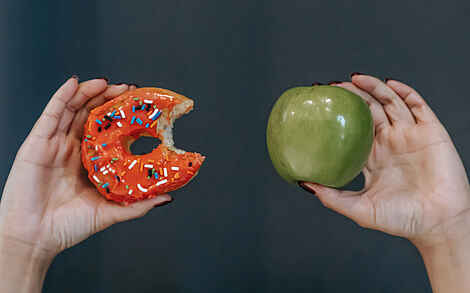The consumption of ultra-processed foods has increased in recent years. Especially in high- and middle-income countries, these account for up to 60 percent of daily energy intake. There is growing evidence that the increased consumption of these high-energy but low-nutrient foods is linked to numerous diseases such as obesity, cardiovascular disease, depression and even cancer. Thus a change in food choices and lifestyle could reduce an estimated 30–50 percent of cancer cases, the second most common cause of death worldwide.
A multicentre, prospective EPIC cohort study (European Prospective Investigation into Cancer and Nutrition) analysed data from over 450,000 subjects (71 percent women and 29 percent men) who did not have cancer at baseline. The study analysed the eating behaviour of participants from ten European countries using validated questionnaires during the period from 1991 to 2001. Both the frequency of consumption and the amount of food were recorded using a seven-day dietary protocol. The assessment of the degrees of processing of the consumed foods was carried out using the four-group NOVA food classification.[1] Cancer registries, in addition to other surveys, served to record cancer cases in the period under investigation.
In the study, Kliemann et al. (2023) were able to show that the risk of developing cancer in general as well as certain types of cancer increased the more (ultra-) processed foods were consumed. It was also noticeable that people who eat more processed and ultra-processed foods not only tend to consume more calories but also more alcohol, which can further increase the risk of cancer.
The causes of the carcinogenic effect of ultra-processed foods are thought to be the adverse nutrient composition, the energy density of these foods as well as the food additives (e.g. flavourings and colourings) they contain. The preservative sodium nitrate can lead to the formation of carcinogenic nitrosamines, and compounds formed during processing (e.g. acrylamide) can also be harmful to health. In addition, increased contact with synthetic chemical components from packaging (e.g. DEHP, BPA) can increase the risk of cancer.
The consumption of ultra-processed food is steadily increasing. Since the data collection was completed in 2001 and the NOVA classification of the food consumed was based on these data, it can be assumed that the situation has become even more acute in the meantime. At the time of data collection, 32 percent of total daily energy intake was accounted for by ultra-processed foods; today, the figure is 60 percent. Also, many more additives are now used in processing. Against this background, the effects of eating ultra-processed foods on cancer risk may currently be even higher than shown in the study.
On the other hand, reducing the consumption of processed and ultra-processed foods (Nova 3 and Nova 4) has a positive effect on the risk of cancer: in the study, a substitution analysis was carried out in which 10 percent of the ultra-processed foods were replaced by minimally processed and fresh foods (Nova 1). By increasing this proportion, the risk of cancer could be reduced overall as well as for certain types of cancer such as oesophageal or breast cancer. This finding is consistent with recent research by the World Cancer Research Fund, which lists minimally processed foods as including whole grains, dairy products and non-starchy vegetables.
Ultra-processed foods are industrially manufactured products such as snack items, ready meals or other convenience foods. In addition to ingredients that may already be processed in themselves, they contain a number of additives and go through various, sometimes energy-intensive processing steps. The study shows, based on extensive data, that the consumption of such foods is more likely to be harmful and even increase the risk of developing cancer. The fact that cancer risk could be reduced by replacing only 10 percent of ultra-processed foods (with minimally processed foods) further underscores their unhealthy impact.
The action of the food industry in offering demonstrably unhealthy products in ever new variations and recipes is economically motivated. Should this not be a wake-up call to all consumers to take their well-being into their own hands, to acquire nutritional competence and to turn to natural or only minimally processed foods, independently of the food industry? This can be achieved, for example, through methods such as mindful eating, intuitive eating or "the three questions"[2] and increases enjoyment. And as the study shows: even a small replacement of ultra-processed foods has a positive effect on health!
Biodynamic farmers produce healthy food to feed the population and do their bit for the earth. They respect natural cycles and contribute to mitigating climate change. In addition, they help to ensure clean water, diverse landscapes, better animal welfare and much more, something which has a positive effect on the health of all living beings (soil, plants, animals and humans).
Bibliography
Kliemann N, Rauber F, Bertazzi Levy R, Viallon V, Vamos E P, Cordova R et al. 2023. "Food processing and cancer risk in Europe: results from the prospective EPIC cohort study.“ The Lancet Planetary Health, 7:219-232.
doi.org/10.1016/S2542-5196(23)00021-9 abgerufen am 19.04.2023
[1] NOVA 1: unprocessed or minimally processed foods; NOVA 2: processed culinary ingredients (e.g. oil, flour); NOVA 3: processed foods (e.g. bread), NOVA 4: ultra-processed foods (e.g. ready meals, snack items).
[2] In: Peschke, J. (2021). Vom Acker auf den Teller. Was Lebensmittel wirklich gesund macht. at Verlag Aarau.
